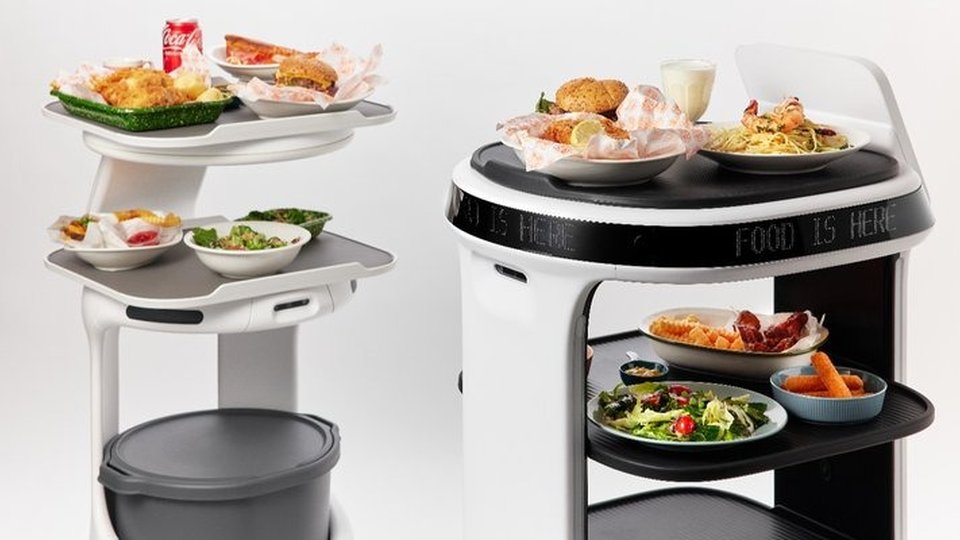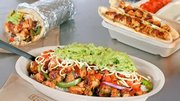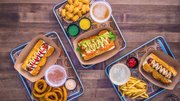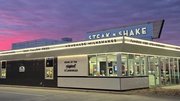Technology
10 robots rescuing restaurant workers
Meet 10 of the robots that Fast casual brands are using to improve the guest experience and provide better service.

January 12, 2024 by Cherryh Cansler — Editor, FastCasual.com
Although restaurant robots used to be viewed as a topic for " the future," that time has come, considering that the hospitality robots market is estimated to grow 12.13% between 2022 and 2027, increasing by $341.91 million. Nearly half of American consumers (46%) said they would order food prepared by automated systems or robots, and 37% would be fine with delivery from these types of technologies, according to the National Restaurant Association's 2023 State of the Industry Report.
"Fast casual businesses have begun to take note that service robots are an effective means for improving the guest experience and providing better service without increasing costs," said Jeff Weiland, the B2B Robotics U.S. team leader for LG Electronics, which has created several robots for the restaurant industry. "The robots' cutting-edge sensors and programming accurately deliver food to customers and assist staff by reducing kitchen runs. At the same time, such an innovative tool can captivate guests, encourage multiple visits and result in positive social media mentions. Overall, it's become clear that these robots can create a unique state-of-the-art experience and work alongside employees to lighten the load during peak business hours."
Since June 2022, four of LG's CLOi ServeBots have been delivering food alongside employees at Arirang K, a Korean barbeque hotspot in Johns Creek, Georgia, said Miok Kim, general manager of Arirang K.
"LG is one of South Korea's most respected technology companies, so we were excited about the chance to try out their brand-new robot," she said. "Everybody liked the first two so much that we upgraded to four LG ServeBots to maximize service levels and guarantee that every customer gets to see the robots in action. The customer experience is also very important to us, and having the ServeBots move around the restaurant is a new and exciting experience for virtually all our customers."
The robots feature three shelves that each hold up to 22 pounds, and they automatically follow commands to travel to specific tables or back to the kitchen, allowing staff to load and unload food from its shelves. This cuts down on the number of times employees must go into the kitchen, giving them more time to attend to customers, said Taylor Robinson, an Arirang K employee.
"If you've ever been in a restaurant with Korean dishes, you know there's often a lot of plates on the table, so I was definitely excited about using the LG ServeBots just because there's so many things to carry," Robinson said. "The main dishes that come out are mostly hot and can be dangerous, so the LG ServeBots are able to help us by bringing those dishes out, and all we have to do is hand it off at the table. They take a lot off my shoulders, literally off my hands. I'm able to meet the customer at the table and hand the food off without any problems. Not to mention that customers just like seeing the robots in general, especially kids, who get really excited about them."
The bots are also helping Arirang K with marketing; social media mentions, for example, quickly grew as patrons posted photos and videos, and staff were constantly greeted by wide-eyed guests talking about how cool it was to finally see real functional robots in their daily life.
Aaron Kim, who introduced Arirang K to LG CLOi ServeBots, predicted that the implementation may represent the future of food service.
"As a company that promotes new technologies to benefit the hospitality industry and its customers, we are always excited when we can show business owners how a new tool or product can captivate guests, encourage multiple visits and result in positive social media mentions," said Kim, who built a relationship with LG's commercial display business working for Bravo E Tech, a producer of commercial-grade golf simulator. He began chatting with LG about how its robots would fit with his business model while also adding a revenue stream and helping to enlarge his reputation for injecting novel entertainment and technology experiences into restaurants.
"While the owners of Arirang K weren't sure how the robots would perform or fit in with their daily operations, they understood the value of being the first place their customers would experience a robotic wait staff assistant," Kim said. "After just two weeks, the first two LG ServeBots had already proved to be a hit among guests and staff, so they ordered two more. I think that speaks for itself."
Meet the robots of the restaurant industry
Arirang K is just one of many restaurants incorporating robotics into their operations. Below is a list of restaurant robots that recently caught the attention of FastCasual editors.
 |
| ADAM's abilities were on display at the MASL USA vs. Mexico All-Star Game, Sept. 10 in Tokoyo, as it served beer provided by Rowdy's Brewery to spectators. Photo: RichTec |
Adam
Created by Nevada-based RichTech Robotics, ADAM combines advanced sensors, artificial intelligence and a user-friendly touchscreen interface to create a wide range of customizable drinks, according to the company. Whether it's a classic milk tea with tapioca pearls or a creative twist on a traditional favorite, ADAM allows businesses to streamline their operations, reduce labor costs and increase efficiency while delivering high-quality drinks to their customers.
The design features two accurate robotic arms that act in unison to mimic the movement of a human. This allows ADAM to create a wide variety of drinks and multitask to speed up the process, according to the company.
The cost is $180,000 for a system, which includes the robot and all ancillary equipment needed to prepare the beverages, such as coffee machines, refrigerators and pumping machines, as well as the physical table and surfaces in which the robot operates.
See it in action: ADAM ruled the small screen during season 3 of "The Kardashians" on Hulu when the robot made margaritas for Kendall Jenner's party.
Alpha Grill
 |
| The Alpha Grill is an automated hamburger patty-cooking robot that cooks eight burgers in under 1 minute. Photo: Aniai |
The Alpha Grill, an automated hamburger patty-cooking robot that cooks eight burgers in under 1 minute, was created by Aniai, a robotic startup headquartered in New York. Dedicated to tackling labor shortages plaguing the food service industry, the robot's dual-burner design and rapid cooking system raise the patties on a vertical platform, pressing them against the top burner for quick and even searing on both sides. The cooked patties are then transported to a warming tray to be picked up by staff, and the robot instantly self-cleans before handling the next batch of burgers, according to the company.
Alpha Grill is packed with AI components to check and control food quality, including an intuitive touch-screen monitor that allows users to customize cooking conditions. They may also access real-time quality metrics, operational stats and inventory data.
All of these features allow restaurants to increase efficiency, reduce costs, and serve better burgers.
Aniai secured a $3 million seed round investment in early 2023, with Capstone Partners and Lotte Ventures leading the funding round.
The cost: $4,000 per month but scales down with volume commitments, according to the company.
See it in action: Coming soon to several New York City restaurants.
BellaBot
 |
| BellaBot delivers swag bags at the Fast Casual Executive Summit in October 2023 in Louisville. Photo: Willi Lawless |
BellaBot, a cat-shaped serving robot, created by China-based PuduTech and Alpharetta, Georgia-based ToDo Robotics, is a cat-shaped delivery robotic solution built to address laborshortages in the service industry. Its dozens of original expressions make the emotional expression of BellaBot more diverse, giving it a more "cat-like" personality, according to the company. It has over 100 dialogs situations and can also be used for hosting, table bussing for cruising.
Since its introduction, the bot, which can sing Happy Birthday, has been adopted in over 600 cities across 60 countries as of June 2023. Equipped with 3D sensors and a modular chassis, it can stop at any angle and move away as soon as it encounters obstacles. It Scheduler has adopted a decentralized, flexible ad-hoc network communication scheme and algorithm architecture, allowing each robot to communicate with any robot in the same network.
The cost: BellaBot is $15,990 and it comes with a battery, a charger, software and a 1-year warranty.
See it in action: One of Japan's largest restaurant groups, Skylark Group has deployed 3,000 units of BellaBot in 2,300 of its stores. It can also be seen at Casa Maya in Jonesboro, Arkansas, as well as numerous hotels and restaurants in China.
Botrista's DrinkBot
Botrista, based in San Francisco, provides automated beverage solutions to foodservice operators, allowing them to increase ticket sizes and beverage attachments by serving non-alcoholic craft beverages. The craft beverages include infused teas & lattes, flavored lemonades, energy drinks and iced coffees via a platform called the DrinkBot. Data shows the drinks drive overall drink sales higher without cannibalizing existing soda sales.
New York City-based The Halal Guys, which has over 100 locations recently implemented DrinkBot, and not only saw an 18% increase in average check size but also collected data that helped determine menu changes.
"When we rolled out on the corporate side, we were constantly reviewing beverage sales, specific individual flavor sales, and we removed two flavors and replaced them due to underperformance, said Andrew Eck, The Halal Guys' VP of Marketing. "Digging in a little more to things like product mix and seeing specifically what's selling, we saw a higher incidence of beverage attachment to checks than we'd had prior to the introduction of the DrinkBot.
 |
The cost: Ingredients, plus a monthly lease.
See it in action: The Halal Guys, Pokeworks, BB.Qm Yoshinoya
Cotton Candy Robot
Developed by Sweet Robo, the Cotton Candy Robot makes cotton candy creations in an array of vibrant colors and shapes, all tailored to meet the unique preferences of each customer. Backed by the power of robotic innovation, customers may witness their treats being spun and formed into dazzling shapes by a sophisticated robotic arm that takes a fresh paper stick and spins different sugars to build flavorful layers, according to the company.
Each machine has a tracking application that gives users access to sales histories, statistical analyses as well as real-time machine status and remote-control capabilities.
The cost: $13,000
See it in action: Entertainment complexes all over the U.S., including Showbiz locations, zoos and Altitude Trampoline Parks as well as Circus Circus in Las Vegas and the Santa Monica Pier.
 |
| Developed by Sweet Robo, the Cotton Candy Robot makes cotton candy creations in an array of vibrant colors and shapes, all tailored to meet the unique preferences of each customer. Photo: SweetRobo |
Flippy
 |
| Created by Miso Robotics, Flippy is a smart commercial kitchen robot that fries a variety of items from French fries to chicken nuggets. Photo: Miso |
Created by Miso Robotics, Flippy is a smart commercial kitchen robot that fries a variety of items from French fries to chicken nuggets. Working alongside humans to enhance quality and consistency, while creating substantial, measurable cost savings for restaurants, the robot
The robot is not only used by mainstream brands, such as White Castle and Jack in the Box, but it will also soon be featured at its own branded restaurant, CaliExpress by Flippy, thanks to a partnership with Cali Group, a holding company using technology to transform the restaurant and retail industries, Miso Robotics and PopID, a technology company simplifying ordering and payments using biometrics.
The restaurant will feature automated grill and fry stations powered by artificial intelligence and robotics that guests will watch cook their food after checking in with their PopID accounts on self-ordering kiosks to get personalized order recommendations and make payments.
The restaurant, located on the northwest corner of Green Street and Madison Avenue at 561 E. Green St., in Pasadena, California, will offer freshly made beef burgers based on a Wagyu blend. It will also be a pseudo-museum experience presented by Miso Robotics that will include dancing robot arms from retired Flippy units, experimental 3D-printed artifacts from past development, photographic displays and more.
The cost: Pricing starts at $4,000 per month
See it in action: White Castle, Jack in the Box
LG CLOi ServeBot
 |
| An Arirang K employee uses LG's ServeBot to deliver food to a guest. Photo: LG |
Created by LG Electronics, the LG CLOi ServeBot, is a smart service robot used in restaurants where service is needed, It features a quick and stable autonomous driving system that can handle various types of flooring and features a guide function for helping customers find their way around, freeing up staff to spend more time on management and administrative duties.
"We've been serving gourmet Korean barbecue and sushi for just over three years now, and we are always looking for ways to improve the guest experience and provide better service without increasing costs," said Miok Kim, general manager of Arirang K, a fast casual Korean Barbecue concept in Georiga. "LG is one of South Korea's most respected technology companies, so we were excited about the chance to try out their brand-new robot. Its cutting-edge sensors and programming accurately deliver food to customers and assist wait staff by reducing kitchen runs. Everybody liked the first two so much that we upgraded to four LG ServeBots to maximize service levels and guarantee that every customer gets to see the robots in action. The customer experience is also very important to us, and having the ServeBots move around the restaurant is a new and exciting experience for virtually all our customers."
The robot's latest version has a 3D camera and a light detection and ranging sensor, allowing it to transport beverages and meals, including soups and noodles, even when traveling over surfaces with a slope of up to 5 millimeters. It also has a 10.1-inch display and built-in content management system and operators may adapt the bot for a specific use by choosing an appropriate facial expression or by displaying videos, images or text. Lastly, it can make menu recommendations as well as advertise in-store promotions or services from partner companies.
The cost: $14,900 per unit
See it in action: Arirang K in Johns Creek, Georgia
Robotic chefs by Remy Robotics
 |
| Remy's autonomous robotic kitchens can cook multiple food types and hundreds of dishes while requiring as little space as 200 square feet, none of the ventilation systems of traditional kitchens and no human chefs. Photo Remy |
For the past two years, secret kitchen laboratories staffed entirely by robots have been cooking gourmet meals for customers in Barcelona, Madrid, Paris and New York City. These robotic chefs, operating out of retail and CloudKitchens locations are the brainchild of entrepreneur and engineer Yegór Traiman, who founded Remy Robotics five years ago with the vision of making high-quality, healthy food accessible and affordable to everyone, according to a company press release.
After years of testing, the robots are now ready to demonstrate their capabilities to deliver what was previously thought impossible, perfectly cooking complex dishes like salmon teriyaki, citrus chicken, and beautifully prepared vegetables like turmeric cauliflower, string beans, and miso buttered corn, Traiman said in a company press release.
With its US launch, Remy Robotics is also unveiling its first-ever robot restaurant brand Better Days, a fast-fine concept offering pricing and convenience comparable to fast food with the quality and taste of a full-service restaurant.
The autonomous robotic kitchens can cook multiple food types and hundreds of dishes while requiring as little space as 200 square feet, none of the ventilation systems of traditional kitchens and no human chefs.
The cost: Visit remyrobotics.com for more info.
See it in action: Better Days, a delivery-only restaurant in New York City on all major delivery apps.
Servi and Servi Plus robots
 |
| Servi Plus robots deliver food at Wings Over Frisco in Texas. Photo: Wings Over Frisco |
RobotLAB, a robotics integrator based in Texas, is working with California's automation and robotics innovator Bear Robotics to expand the availability of the Servi and Servi Plus robots in the restaurant and hospitality spaces.
Bear Robotic, which has deployed over 10,000 robots worldwide, specializes in automation and guest enhancement solutions. Its Servi robot is a self-driving robot used for running food, delivering drinks and bussing tables. The Servi Plus model includes the features of Servi, as well as responsive lighting, an expanded 16-plus dish capacity and an 88-pound payload to cover large restaurants and busy rushes.
Both robots are NSF-certified and able to integrate into any service industry workflow while adhering to all health code and compliance standards.
The cost: $999 monthly fee for Servi in the U.S.
See it in action: Wings over Frisco, a sports bar in Frisco, Texas.
The Wingman
 |
| The Wingman, created by Nala Robotics, can handle everything from breading, frying, tossing, saucing and even. Photo: Nala |
An AI-powered robotic multifryer, the Wingman, created by Nala Robotics, can handle everything from breading, frying, tossing, saucing and even. It's available 24/7 without human intervention and its language processing capability allows it to respond to customer orders at the point of sale or operational commands from the kitchen.
Nala also added two self-cleaning robots — Bowl Bot and Sandwich Bot — to its lineup. Bowl Bot can prepare an infinite number of salad bowls, vegan bowls and burrito bowls, allowing consumers to select from 28 ingredients of bases, proteins and toppings, including chopped and sliced assorted vegetables, meats and cheeses. It also can grip and control sauce bottles while administering food portions with 95% accuracy, ensuring quality and consistency, while eliminating food waste, according to the company.
Within a 16-foot by 12-foot space, Sandwich Bot can prepare nearly any type of sandwich from 48 choices of meats, vegetables and cheeses, giving customers a choice of bread and various spreads and sauces.
The cost: Monthly rental options start at $2,999 per month.
See in action: One Mean Chicken, Surya Tiffins and Thai76, which are owned by Nala and in Naperville, Illinois.
About Cherryh Cansler
Included In This Story
Botrista
Botrista empowers partners to serve trending, high-quality beverages with ease. Using premium ingredients and a data-driven approach, implementation, operation, and scaling are simplified—ensuring consistency, quality, and profitability in an effortless, ever-evolving program.
 ChatGPT
ChatGPT Grok
Grok Perplexity
Perplexity Claude
Claude













